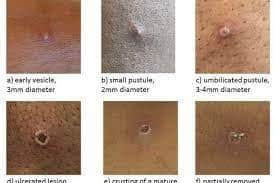Monkeypox UK: The World Health Organisation declares global health emergency - What is Monkeypox? How do you treat it? And how worried should we be?
While WHO declared its highest alert yesterday (July 23) following a surge of cases, UK health officials said the threat to the UK remains the same as it had been the day prior.
What’s the situation in the UK and Yorkshire?
As of July 21, there were 2,208 confirmed cases in the UK, with 2,115 are in England.


Advertisement
Hide AdAdvertisement
Hide AdJust 35 cases have been reported across Yorkshire and the Humber as of July 18.
Symptoms of the infection include a temperature, headaches and a rash similar to the appearance of chickenpox.
How do you treat Monkeypox?
Monkeypox is usually mild and most people recover within a few weeks without treatment, explains the NHS website.
But, if your symptoms are more severe and you become unwell, you may need treatment in hospital.
The risk of needing treatment in hospital is higher for:
- older people
- young children
Advertisement
Hide AdAdvertisement
Hide Ad- people with a condition or who are taking a medicine that affects their immune system
Because the infection can be passed on through close contact, it's important to isolate it if you're diagnosed with it.
You may be asked to isolate at home if your symptoms are mild.
Is there a Vaccine?
Vaccines to protect those at risk from monkeypox will not be widely available until September a sexual health organisation, Yorkshire Mesmac, has warned.
Advertisement
Hide AdAdvertisement
Hide AdThe smallpox vaccine is being rolled out to those most at risk of the disease, which began spreading earlier this year.
The vast majority of people who have contracted monkeypox are men who have sex with men.
Tom Doyle, the chief executive of Yorkshire MESMAC, said: “One of the issues is that the stock of the vaccination is really small.
“The Government have ordered more and it’s getting better and by September we’re expecting it to be okay.
Advertisement
Hide AdAdvertisement
Hide Ad“But that’s quite a while to wait so in the meantime sexual health clinics are inviting in those most at risk after looking at their records.”
Mr Doyle said risk factors could be based on if someone had previously had a history of infections, was known to have had multiple sexual partners or was on the list for PREP, the preventative drug for HIV transmission.
He said: “It’s a great first step that the Government has ordered an extra 100,000 vaccines but we think we need to double that now, based on modelling from the National Aids Trust.
What is monkeypox?
It is a rare infection mainly spread by wild animals in parts of west or central Africa.
The risk of catching it in the UK is very low.
What are the symptoms of monkeypox?
Advertisement
Hide AdAdvertisement
Hide AdIf you get infected with monkeypox, it normally takes between five and 21 days for the first symptoms to appear.
The initial symptoms of monkeypox include:
- A high temperature
- A headache
- Muscle aches
- Backache
- Swollen glands
- Shivering (chills)
- Exhaustion
A rash normally appears one to five days after the first round of symptoms. The rash often starts on the face, then spreads to other parts of the body.
The rash can be confused with chickenpox; it begins as raised spots, then turn into small blisters filled with fluid. Gradually over time, these blisters form scabs which later fall off.
The symptoms usually last for two to four weeks.

